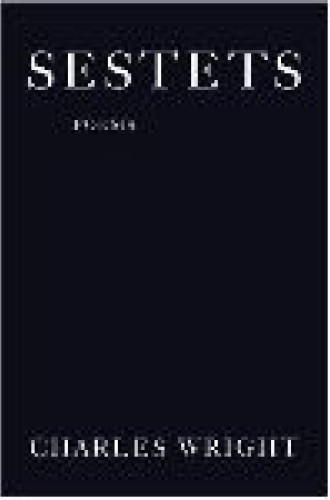Sestets: Poems
Charles Wright makes a compelling argument for the spiritual discipline of just hanging around. In a 1992 interview, Wright described his poetic subject as “language, landscape, and the idea of God.” More often than not, in his poems Wright speaks of or to his Maker as if the two were sitting in rocking chairs on Wright’s back porch, whiskeying away another sunset.
His combination of immediacy and wistfulness can lend his work a singular spiritual authenticity, at once contemporary and rooted in our oldest longings. Though meditation on the natural world often pushes his poems into explicitly religious idioms, Wright is never quite at home in these realms and is happiest to let his striking images speak for themselves. Wright seems caught between the incredulousness of a specific theism and the vacuousness of total disavowal. His poems ask valuable questions about the imagination’s ability to abide and evolve within this narrow space.
When he was younger, Wright served in the army in Italy, studied in Iowa, traveled in Europe and Asia, and taught in California. Now in his mid-seventies, he has settled down in central Virginia, where he is producing books at a rate (nine in the last 15 years) almost unheard- of for poets, even in the profligate publishing climate of contemporary verse. His latest book, Sestets, takes up his familiar subject matter (words, creation, the Creator) in a series of 72 six-liners that, despite their hokey titles (“Sunlight Bets on the Come,” “Autumn Is Visionary, Summer’s the Same Old Stuff”) are capable of bursts of terrific freshness.
Gerard Manley Hopkins, one of Wright’s precursors in the inability to resist daubing the natural world with doctrine, walked home after a day of fishing to write: “These things, these things were here and but the beholder / Wanting.” In Sestets, Wright proceeds by a similar logic, looking no farther than a morning walk in the forest or an evening window during a storm for a “wanting” strong enough to spark a poem. A piece early in the book, “Anniversary II,” is triggered by the tiniest of commotions: “Dun-colored moth past the windowpane.” Five lines later, the poem ends, “Crack in the bulbous sky the moth is yo-yoed up to.” Little happens in between, but there’s plenty going on here. Read those two quotations again: hear how the first line flits between n and p sounds, finally trapped in the word windowpane; in the latter line, watch how Wright’s choice to end the sentence on a preposition tugs the whole line upward, as if on a string. At its best, Sestets demands that readers match the close attention occurring behind the scenes of these poems with their own attentiveness.
For a certain kind of soul, the pleasures of an art cannot satisfy the unanswered questions provoked by its practice. “Description is expiation, / and not a place to hunker down in,” as Wright reminds himself. Even as he labors over his still lifes in Sestets, Wright acknowledges the gap between what actually happens and what he can say, however delicately, about it. More insistently than previous Wright volumes, this book conveys the poet’s resignation that human imagination, art and faith included, cannot bridge such a gap. “Sundown Blues” shows how, for Wright, praise for creation’s beauty must also retain a certain grievance. Behind the folksy facade of the poem’s last line—“So move along, boy, just move along”—the pathos of Wright’s theological complaint endures: if we witness wonder, why can’t we say it? The strongest poems in this book suggest that the risks for which Wright has been rightly praised (the use of chameleons as a verb, for example) may originate from his underlying desperation about poetry’s ability to do justice to experience.
For serious religious poets, the line is always fine between writing as an act of faith and writing as a staving off of, or distraction from, despair. The indistinctness and sheer quantity of Wright’s recent work indicate that it may belong in the latter category. Sestets is a specimen of the naturalistic, individualistic breed of faint faith that still lingers in American literature, undisturbed for fear of being snuffed out.





